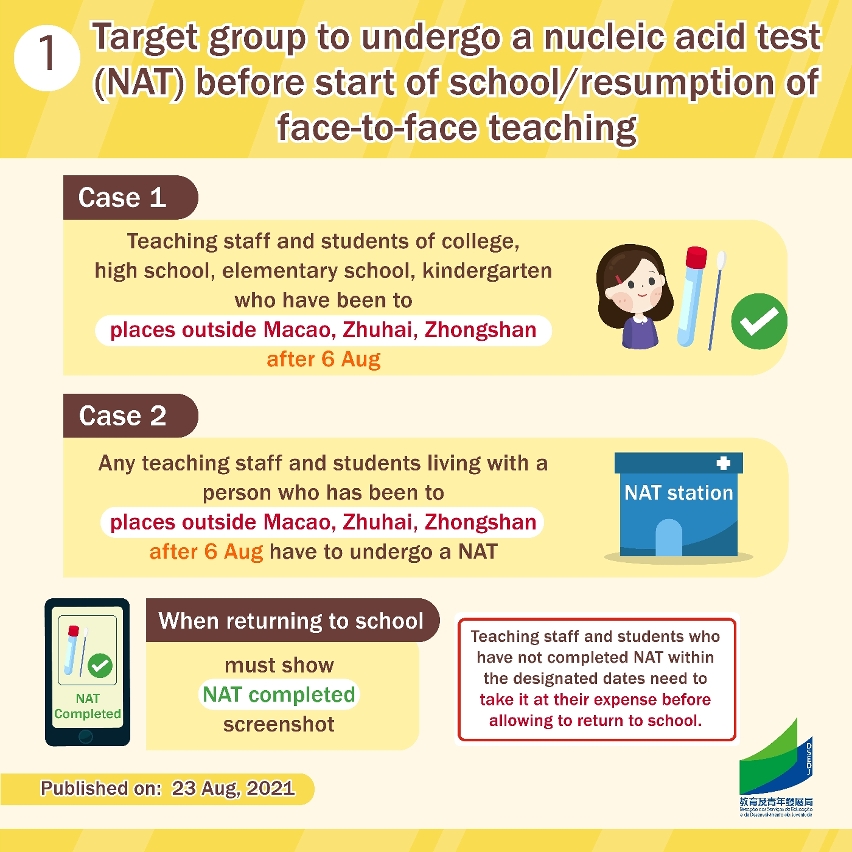 Target group to undergo a nucleic acid test (NAT) before start of school/resumption of face to face teaching
Target group to undergo a nucleic acid test (NAT) before start of school/resumption of face to face teaching
The DSEDJ constantly pays attention to the prevention and control of the infection for the new school year, keeps close contact with health departments, dynamically studies and judges the constant changes in the development of the epidemic situation in Macao and mainland China. After analysing and studying the situation with health departments, if there are no major changes in epidemic situation, non-tertiary education students start school from 1 Sept onwards as scheduled and tertiary education students gradually resume face-to-face teaching from 6 Sept onwards.
The DSEDJ proposed a preliminary plan on 13 Aug, requesting all students and teaching staff to return to their place of residence in Macao, Zhuhai, Zhongshan 14 days before the start of new school year or resumption of face-to-face teaching. At the present time, most of the students and teaching staff have returned to their place of residence. The DSEDJ has learnt from schools the situation of teaching staff and students leaving Macao during summer vacation, a certain proportion of college students from mainland China have returned to higher education institutions in Macao. After analysis and study of the situation, it is believed that the start of new school year as scheduled and resumption of face-to-face teaching will be important parts of the resumption of social normalization recently. Stricter measures will be adopted to prevent and control the infection.
To ensure that the new school year can start safely as scheduled, safeguard students’ health, the DSEDJ and health departments will adopt the epidemic prevention measures for the start of school with higher standards and make adjustments to the preliminary plan. Some students and teaching staff will be requested to undergo a nucleic acid test 5 days before school opening or resumption of face-to-face teaching. The target groups are students and teaching staff who personally, or whose housemates, have been to places outside Macao, Zhuhai, Zhongshan after 6 Aug. Such students and teaching staff must show a screenshot indicating that the nucleic acid test is completed when returning to school.
The above-mentioned target groups will be arranged to take a free nucleic acid test at the 6 test stations in Macao. The testing period for non-tertiary education is from 27 to 31 Aug and that for tertiary education is from 1 to 5 Sept. A special reservation platform will be set up for them. The test result cannot be used for crossing the border. Through increasing the number of test stations, increasing the number of bookings and testing volume per hour at the existing test stations as well as providing a special queue for schools, teaching staff and students are facilitated to take the test. Besides, cross-border students and teaching staff who already have a valid nucleic acid test result for crossing the border do not need to return to Macao to join in the aforesaid testing arrangements 5 days before start of school. Students and teaching staff who have not completed the nucleic acid test within designated dates will need to take the test at their expense before allowing to return to schools.
The DSEDJ calls on students, teaching staff and parents to continue to remain extremely vigilant, not to lower their guard and reduce non-essential cross-border movement before school opening. Besides, they should pay close attention to the SAR government’s anti-epidemic information and cooperate with schools on epidemic prevention measures for the new school year.







